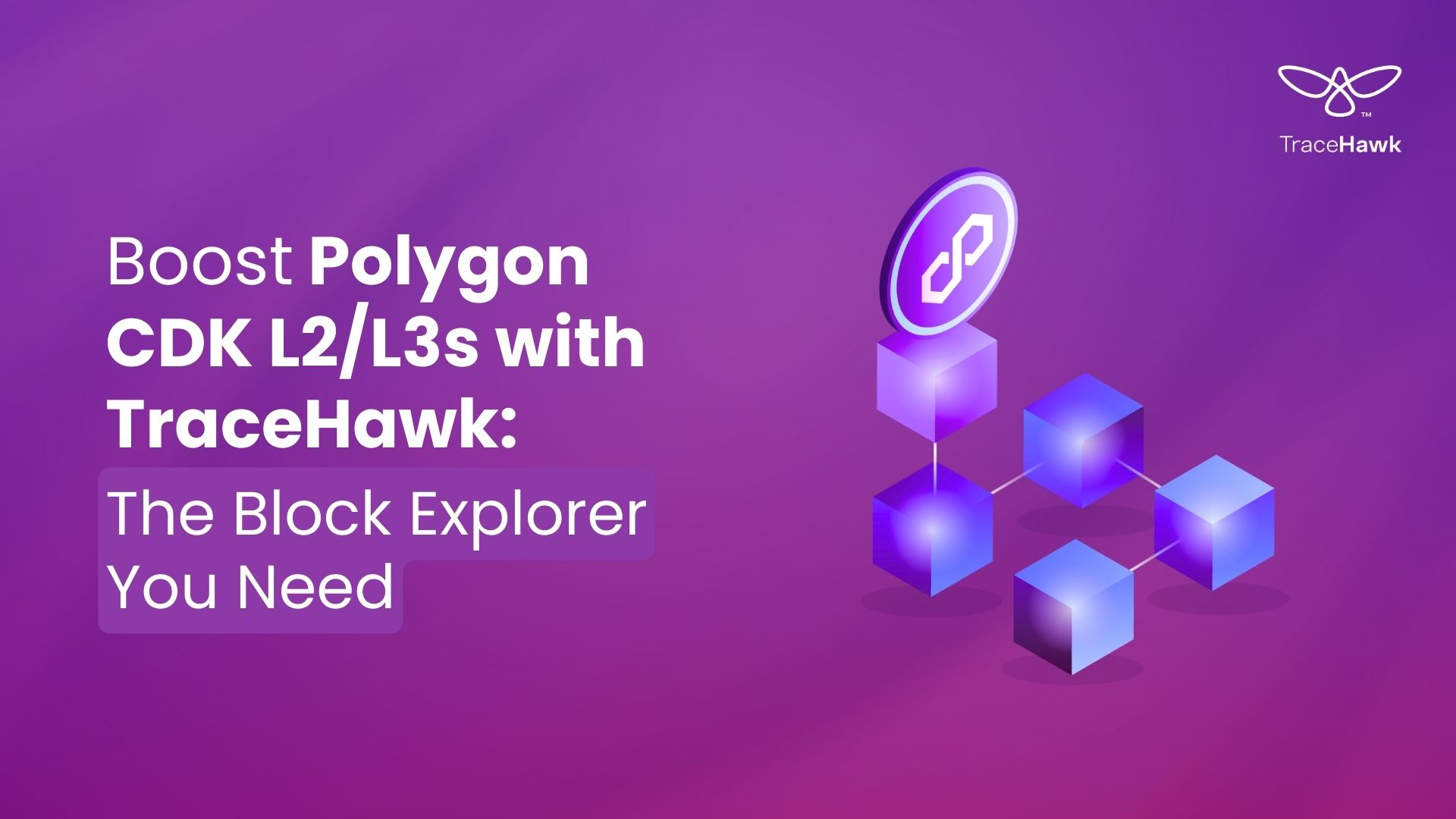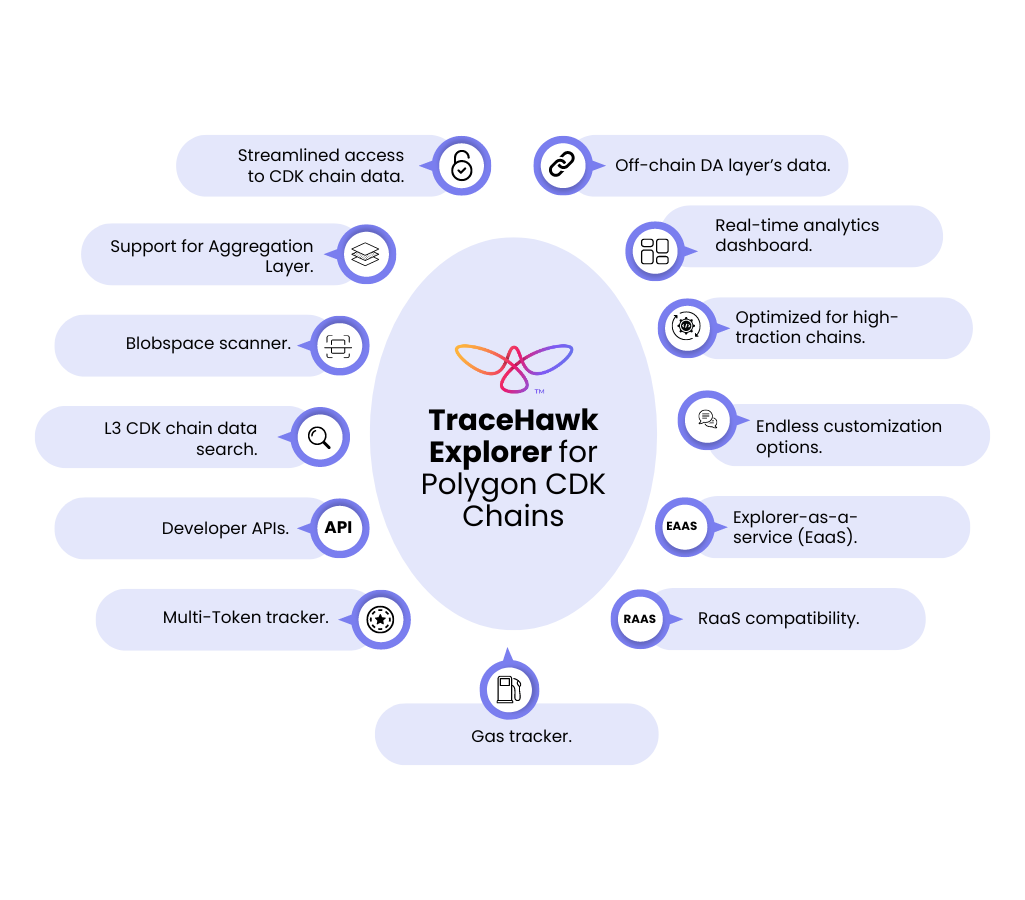Boost Polygon CDK L2/L3s with TraceHawk: The Block Explorer You Need


TraceHawk has optimized its support for Polygon CDK chains. The decision to launch a dedicated CDK-specific explorer comes from the rapidly growing demand for CDK L2/L3s and their unique features & functionalities. Web3 projects or developers launching an L2/L3 CDK chain can use TraceHawk as their explorer to search real-time and historical data, including information related to blocks, smart contract addresses, transactions, and more. TraceHawk explorer for Polygon CDK chains is by far the most-suited search engine and analytics tool to cater to the specific needs of different CDK chains– whether built as validium, rollup, or aggregated layer. In this article, we will learn more about TraceHawk’s features while also briefing Polygon CDK chains.
Polygon CDK chains refer to modular ZK-powered Layer2s that can be easily customized to the specific application needs. As evident, these chains are built using a Polygon chain development kit or CDK– an open-source and modular toolkit designed to facilitate the seamless launch of custom L2/L3 chains. Full EVM compatibility, flexible components, dedicated throughput, and native gas tokens are the widely known attributes of CDK chains. However, the benefits and options are now varied, such as the options to build Aggregated blockchain, choose validium, add next-level modularity to chains, provers, and a lot more. Meaning that Polygon CDK’s offerings keep innovating from time to time, unlocking broad opportunities for web3 projects.
As discussed, Polygon CDK chains are unique in terms of features, benefits, and most importantly– the structure & mechanism. For example, your CDK chain can be a validium, rollup, or aggregated blockchain. Also, your CDK chain might be modular to use a decentralized sequencer, off-chain data availability (DA), Type1/Type2 prover, and so on. This demonstrates that Polygon CDK chains are different from other rollup chains and hence, their need for block explorer can also differ. Due to this reason, we can see many block explorers now adding support for CDK chains to offer specific features.
TraceHawk is a fully-customizable, open-source, plus multi-ecosystem block explorer that seamlessly supports all the leading Layer2 and Layer3 chains, including the ones created using Polygon CDK framework. With TraceHawk, you get all the standard features like an interactive UX, lightning fast search, advanced filters, etc. Speaking about Polygon CDK chain-specific use, it offers in-depth search of CDK chains, support for Agglayer chains, retrieval of DA layer’s data, blobs data exploration, and more that we have discussed in-detail below.
With TraceHawk block explorer, users can do an in-depth exploration of Polygon CDK L2 and L3 chains to retrieve data similar to the below:
TraceHawk is optimized to be your ultimate block explorer and analytics platform for Aggregated blockchains. This integration aims to provide users and developers an easy & streamlined access to comprehensive on-chain data appearing all across the Aggregated blockchains. As you may know, the concept of AggLayer is to enable native interoperability across sovereign CDK chains. TraceHawk wants to keep this unified experience intact by offering you a more holistic view into Agglayer chains and their bridge transactions.
Knowing that EIP-4844 allows for the implementation of blobs or ‘blob carrying transactions’ on Polygon, TraceHawk has optimized its support to allow for a seamless exploration of data from batched call data that L2 publishes and later stores on the DA layer. For this, TraceHawk implements advanced data indexers that communicate with the chain and make the data available round the clock upon each query.
Several projects are choosing to build their CDK chains as Layer3s. The reason for this can be to achieve better interoperability or support very use-case specific applications. Hence, if you are building a Polygon CDK L3, TraceHawk can be your ideal block explorer solution to perform a deep search into L3 chains. It will allow you to search for all sorts of critical data, such as deposits, withdrawals, DA layer information, and more.
TraceHawk explorer for Polygon CDK chains comes with high-availability APIs– REST and GraphQL APIs that developers and CDK chain users can leverage to query network-level data using API endpoints. For better accessibility, these APIs are designed to be open-source and accessible publicly to everyone.
TraceHawk allows CDK chain users to filter data based on tokens with an intuitive multi-token search feature. As required, you can search for ERC-20, ERC-721, ERC-1155, and ERC-404 tokens to get all the necessary details about them, such as real-time price, transfers, FDV, total supply, contact info, and holders.
Using the ‘gas tracker’ feature of TraceHawk, you can dive deeper into the gas usage of your preferred addresses on CDK chains. From the interface, you can track all the critical gas-related details, such as real-time gas usage and fees during various network stages: slow, average, or fast processing. You can filter the gas details based on historical and real-time trends.
As Polygon CDK chains have the flexibility to post calldata on-chain or any 3rd party off-chain DA layer, TraceHawk allows for end-to-end exploitation of this alternative DA layer’s data. You can anytime retrieve all kinds of DA data, such as transaction call data, smart contract data, and other off-chain data.
TraceHawk comes with a comprehensive analytics dashboard that provides a snapshot of all the important CDK chain insights in one place. From chain-specific data such as total blocks, block time, and gas fee to daily & weekly transactions, you will get all the important information that gets updated in real-time.
Given that ‘dedicated throughput’ is one of the main USPs of the Polygon CDK, TraceHawk has performed critical optimization on the explorer so that it can maintain high-performance even for CDK chains with massive traction. Such projects are mostly DeFi dApps or gaming platforms that see millions of daily active users and billions of transactions.
TraceHawk serves as a personalized block explorer for rollups and appchains. Speaking about CDK chains, they have a range of customization options to make TraceHawk more specific to the use-case. For example, you can expand the search features, add support for the latest tokens, create a unique watchlist, or redesign the analytics dashboard.
With TraceHawk’s Explorer-as-a-service (EaaS), you get a fully-hosted and fully-managed explorer for your Polygon CDK chains. From offering enterprise-grade infrastructure to scaling the explorer, the TraceHawk team will handle all the challenging aspects, offering you an enchanting user experience. Also, you don’t need to worry about the performance since TraceHawk implements a robust 24/7 monitoring system for your explorer, keeping track of its performance while also solving the issues immediately after it is spotted.
Seeing the tremendous popularity of RaaS, TraceHawk has integrated its ecosystem critically to make it suitable for Rollups–as–a–service. This means, if your Polygon CDK chain is managed by RaaS service, you can still plug-in TraceHawk to use as your official explorer. Additionally, TraceHawk can be used by RaaS providers as a third-party explorer service.

TraceHawk block explorer and its explorer-as-a-service (EaaS) is ready for Polygon CDK chains and other L2/L3 rollup chains to use. If you are launching such a chain, you can give TraceHawk a try and analyze its offerings. The features we discussed in the article are just an overview of TraceHawk’s offerings. For a holistic view, you can try TraceHawk yourself. Also, if you’re looking to add specific customizations to your explorer, connect with us. Our experts are also open to handling all your queries. You can send them via mail, or you can schedule a one-to-one call for a detailed discussion.
